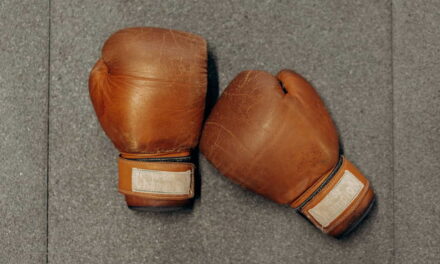Warming Up!
Chit-Chat
Make small groups and share:
A piece of advice that stopped a bad habit in you.
Ans: Instead of worrying about your mistakes, learn from them and do better next time.
I always get worried when I get low marks or I make a mistake. My mother told me worrying will not solve anything. Instead learn from my mistakes, that way I can do better next time and progress in life.
A quote/proverb that you love to use often.
Ans: “Don’t let what you cannot do interfere with what you can do.” – by John Wooden.
An experience that taught you a lifelong lesson.
Ans: I had to complete a project and was running out of ideas on how to start. I tried but it was going very slowly and I was afraid I will not be able to complete on time.
Then few of my friends called me and they said they were experiencing the same thing. We decided to come together and complete the project. Once we were together, we were able to come up with various ideas and then one by one implement all of those. Since we were four of us, we were able to quickly complete the project and then I realized the importance of “Teamwork”.
A story /news / episode / movie / play that has impressed and changed you.
Ans: I was impressed with the Hindi movie Mary Kom. I learned the importance of hard work through that movie. I learned that if I work hard, then no matter what my circumstances, I can do well in life.
1. Many slang expressions/terms are used for people having positive or negative traits.
Match the expressions in Column A with type of persons in Column B.
Direct Answers Given Below
- Couch Potato – (d) lazy/good for nothing
- Worry Wart – (f) always nervous/worried
- Fuddy-duddy – (g) old-fashioned/refuses change
- Wet blanket – (e) spoils other people’s fun/mood
- Whiz – (a) brilliant/genius
- Black sheep – (c) shameful person
- Live wire – (b) very energetic/active
2. Discuss in your group and write the difference in reactions of an Optimist and Pessimist in the given situations.
Failure in exams/tests
Optimist: Will see it as an opportunity to learn and do better next time.
Pessimist: Will be sad and start getting afraid of exams.
Lose a good amount of cash
Optimist: Will learn why they lost the cash and be careful next time.
Pessimist: Will be nervous and keep worrying about the loss.
Unexpected rainfall/bad weather
Optimist: Will look for other things to do at home or wherever they are.
Pessimist: Will be constantly complaining on how their plans got ruined.
Illness
Optimist: Will see it as an opportunity to make their health better.
Pessimist: Will be scared of their illness and afraid to do anything.
Extra classes in school
Optimist: Will see it as an opportunity to learn more.
Pessimist: Will complain about losing their time.
From the Chapter Pages
1. Who is Meena?
Ans: Meena is a good friend of the author Sudha Murthy.
2. What was Meena’s nature like?
Ans: Meena’s nature was pessimistic. She had a negative attitude and saw the worst in things.
3. What is meant by ‘she never had anything positive to say’?
Ans: “She never had anything positive to say” meant that Meena was a pessimistic person who always saw the worst in every situation. She was gloomy and cynical.
4. Describe the location in Mumbai, where the writer spotted Meena.
Ans: The writer spotted Meena in the Flora Fountain area of Mumbai. She was standing near Akbarally’s, a popular department store to avoid the rain.
5. What is the difference between an optimistic person and a pessimistic person?
Ans: An optimistic person always see the positive side of a situation while a pessimistic person always see the negative side of a situation. Optimistic people are usually happy while pessimistic people always complain and are unhappy.
6. Find out more about Sudha Murthy and her writings from the Internet.
Ans: Sudha Murthy is an Indian social worker, author and chairperson of the Infosys Foundation. She is also a teacher and has an engineering degree. She has written books in Kannada as well as in English.
Some of her books include:
- The Mother I Never Knew
- Three Thousand Stitches
- The Man from the Egg
- Here, There, Everywhere
- Magic of the Lost Temple
7. What lesson did Meena learn from her guru – the beggar?
Ans: Meena learned the art of being happy from her guru – the beggar. She learned to look at her life and comforts and be more grateful for what she had.
8. Describe an experience, where somebody has changed your way of looking at life.
Ans: I know a person who gave up a good corporate job to become a teacher in a small village so that he could help underprivileged children to be successful in life. When I saw this, I changed by own attitude towards life and understand what success truly means.
9. How did the beggar and his granddaughter enjoy the rain?
Ans: The beggar and his granddaughter enjoyed the rain by laughing, clapping and screaming joyously. They were playing on the road and were happy.
10. What did Meena do to show gratitude to her guru?
Ans: Meena sponsored her guru’s granddaughter to a boarding school to show her gratitude.
English Workshop
1. Complete the following table.
Utterance – Who said – To whom
“Shwetha is a very beautiful girl, isn’t she?”
Who Said: Author Sudha Murthy
To Whom: Meena
“When a pony is young, he looks handsome?”
Who Said: Meena
To Whom: Author Sudha Murthy
“It’s a beautiful day.”
Who Said: Author Sudha Murthy
To Whom: Meena
“No, the sun is too hot.”
Who Said: Meena
To Whom: Author Sudha Murthy
“I’m all excited, it’s nice to meet old friends.”
Who Said: Meena
To Whom: Author Sudha Murthy
“Let’s chat.”
Who Said: Meena
To Whom: Author Sudha Murthy
“We won’t get a taxi in this rain.”
Who Said: Author Sudha Murthy
To Whom: Meena
“Then, what’s the secret of your energy?”
Who Said: Author Sudha Murthy
To Whom: Meena
“A beggar changed my life.”
Who Said: Meena
To Whom: Author Sudha Murthy
2. State whether the following statements are right or wrong. Correct the wrong ones.
(a) The author and Meena were great enemies.
Ans: Wrong. The author and Meena were good friends.
(b) Meena was a very cheerful person initially.
Ans: Wrong. Meena was a pessimistic person, always gloomy and cynical.
(c) Meena stayed alone in an apartment in Delhi.
Ans: Wrong. Meena stayed alone in an apartment in Bangalore.
(d) Meena was the second child of her parents.
Ans: Wrong. Meena was the only child of her parents.
(e) The author spotted Meena at Bombay’s Flora Fountain.
Ans: Right.
(f) The beggar and the young girl were playing on the road because there was a lot of traffic.
Ans: Wrong. The beggar and the young girl were playing on the road because there was no traffic.
(g) The scene of the beggar and the girl made Meena peep into her own life.
Ans: Right.
(h) The beggar became Meena’s role model.
Ans: Right.
(i) It took Meena almost two years to put the change into effect.
Ans: Right.
(j) Meena was able to give Gurudakshina directly to her Guru, the beggar.
Ans: Wrong. By the time Meena was able to understand things, her guru, the beggar was dead.
3. Choose the correct alternative to complete the sentences.
Direct Answers Given
(a) Meena, who is an LIC officer, is
(i) a pessimistic person
(b) The writer was standing near Akbarallys, a popular department store because
(ii) she was waiting for rain to stop.
(c) The only thought in the writer’s mind till they reached the Grand Hotel was
(ii) what had brought about such a change in Meena.
(d) Meena sponsored the granddaughter of the beggar because
(ii) it was a token of respect for the beggar.
4. How did the beggar change Meena’s attitude? Discuss with your partner and complete the following web.
Beggar’s activities that changed Meena’s attitude
- The beggar and his granddaughter were playing on the road.
- The beggar was laughing, clapping and screaming joyously as if they were in paradise.
- Hunger and rain did not matter to him.
- The beggar was totally drenched and totally happy. He knew how to be happy.
5. (A) Write in your own words:
How did Meena show her gratitude to her guru?
Ans: Meena showed her gratitude to her guru by sponsoring his granddaughter to a boarding school so that she could complete her education.
(B) Why would Meena be sad initially ? Give reasons. Pick out sentences from the story which prove that Meena was a pessimist.
Ans: Meena would be sad initially as her pessimistic nature made her see only the negative things in any situation. She was always gloomy and cynical.
Sentences from the story:
(a) She was forever unhappy.
(b) It was as though her gloom and cynicism had a way of spreading to others.
(c) She never had anything positive to say on any subject or about any person.
(d) ‘Naturally, his father is a school teacher.’
(e) ‘When a pony is young, he looks handsome. It is age that matters.’
(f) She was the only child and had the habit of complaining about anything and everything.
6. (A) Find antonyms of the following words from the story.
Optimistic – pessimistic
Drizzle – pouring
New – old
Lie – truth
Ugly – beautiful
Frowned – smiling
Hell – paradise
Unhappy – happy
Disrespect – respect
unimportant – important
(B) Go through the points below showing Meena’s encounter with the beggar that transformed her completely. The sequence of events are jumbled up below. Arrange the events according to the occurrence. Fill in the number as per sequence.
Answer:
1) I saw from the window the beggar and the young girl playing on the road.
2) They enjoyed playing in the rain as if they were in paradise.
3) On seeing them so very happy, I felt ashamed of myself.
4) I decided to change using the beggar as role model.
5) It took two years to put the change into effect.
7. How did the beggar change Meena’s attitude towards life? Write it down in 5 to 6 lines. One is done for you.
- The incident made Meena to look at her own life.
- She realized she had so many comforts that the beggar did not have.
- The beggar knew how to be happy which Meena didn’t.
- Meena felt ashamed of herself.
- She started to make a list of things she had to be more grateful.
- Now, she was always happy, finding happiness in every small thing.
8. Summarise the story with the help of the points given below.
(a) Meena’s initial attitude (b) Meena’s meeting with Sudha Murthy in Mumbai (c) Beggar’s incident (d) Change in attitude
Meena worked in Bangalore in LIC earning a good salary. She was the friend of the author Sudha Murthy. However, Meena was an extremely pessimistic person. She was always gloomy and cynical. She never had anything positive to say about any subject or any person. She stayed alone in an apartment and had the habit of complaining about anything and everything. One day, Meena was transferred to Mumbai and the writer eventually forgot about her. Many years later, during a trip to Mumbai, the writer Sudha Murthy was caught in heavy rain at Mumbai’s Flora Fountain. When she took shelter from the rain at a nearby department store, she happened to meet Meena. The writer initially wanted to avoid Meena but soon she saw a remarkable change in her attitude. She wanted to find out more about how Meena had become so cheerful. During tea at the Grand Hotel, Meena explained to Sudha Murthy that a beggar changed her life when she saw him playing, laughing, clapping with his granddaughter in pouring rain. The beggar was drenched and yet felt like he was in paradise. This made Meena look at her own attitude and was ashamed of herself. She had so much to be grateful for and yet she was not happy like the beggar. She decided to use the beggar as a role-model and completely change her attitude. It took her two years to completely transform into a cheerful and smiling person who always found happiness in every small thing. Although the beggar was dead by the time Meena understood things, she sponsored his granddaughter to a boarding school as a mark of respect to her guru.
9. Write the above summary making Meena the narrator. Begin with ‘I worked in Bangalore in LIC. Sudha was my friend…’
I worked in Bangalore in LIC earning a good salary. I was the friend of the author Sudha Murthy. However, I was an extremely pessimistic person. I was always gloomy and cynical. I never had anything positive to say about any subject or any person. I stayed alone in an apartment and had the habit of complaining about anything and everything. One day, I was transferred to Mumbai and the writer eventually forgot about me. Many years later, during a trip to Mumbai, the writer Sudha Murthy was caught in heavy rain at Mumbai’s Flora Fountain. When she took shelter from the rain at a nearby department store, she happened to meet me. The writer initially wanted to avoid me but soon she saw a remarkable change in my attitude. She wanted to find out more about how I had become so cheerful. During tea at the Grand Hotel, I explained to Sudha Murthy that a beggar changed my life when I saw him playing, laughing, clapping with his granddaughter in pouring rain. The beggar was drenched and yet felt like he was in paradise. This made me look at my own attitude and was ashamed of myself. I had so much to be grateful for and yet I was not happy like the beggar. I decided to use the beggar as a role-model and completely change my attitude. It took me two years to completely transform into a cheerful and smiling person who always found happiness in every small thing. Although the beggar was dead by the time I understood things, I sponsored his granddaughter to a boarding school as a mark of respect to my guru.
10. Project:
Divide the class in four groups. Collect four different stories written by Sudha Murthy. Select a story for every group and write it in the form of a play. Enact it in front of the class.
Students are expected to do this project on their own.
Language Study
1. Punctuate the following sentences.
(a) did you give any gurudakshina to your guru i asked.
Ans: “Did you give any gurudakshina to you guru?” I asked.
(b) no there isnt anyone like that she said.
Ans: “No there isn’t anyone like that,” she said.
2. (a) Add a suffix to the following words and make nouns.
(i) kind – kindness
(ii) happy – happiness
(iii) ignore – ignorance
(iv) assure – assurance
(v) imagine – imagination
(vi) depute – deputation
(vii) manage – management
(viii) assess – assessment
(b) Make 4 meaningful words by using letters from “Pessimistic”.
Ans: Time, Pest, Mist, Tip, Sip, Pets, Met
3. Change into Indirect speech:
(a) “Meena, it’s a beautiful day,” I said.
Ans: I told Meena that it was a beautiful day.
(b) “Hey! I am really excited. It’s nice to meet old friends. What are you doing here?” said Meena.
Ans: Meena greeted her and said she was really excited. It was nice to meet old friends. She asked what she was doing there.
(c) “We won’t get a taxi in this rain”, I grumbled.
Ans: I grumbled that we wouldn’t get a taxi in that rain.
(d) “So what? We’ll buy an umbrella and then go to the Grand Hotel”, she said.
Ans: She asked so what. They could buy an umbrella and then go to the Grand Hotel.
(e) “Did you give any gurudakshina to your Guru ?” I asked.
Ans: I asked her whether she had given any gurudakshina to her Guru.





